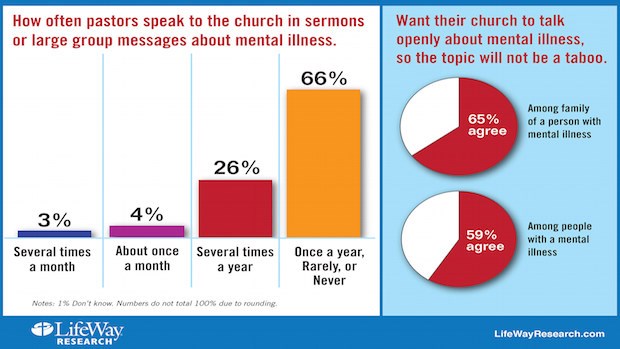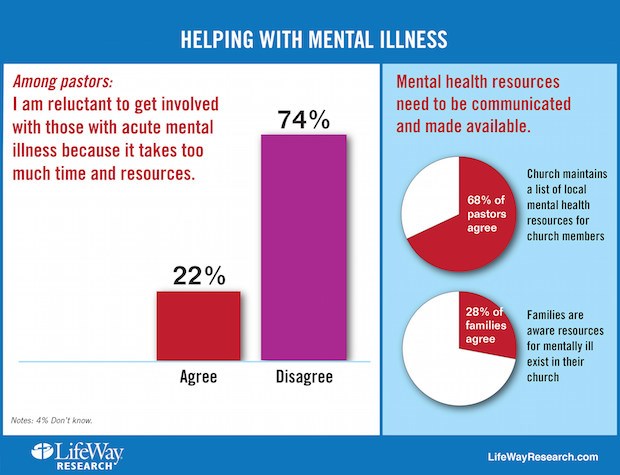The Church and Mental Illness

Christians can’t run from this subject.

While some stories garner much media attention, beneath the surface this issue touches many of us deeply. We all have friends and family members who suffer with mental illness, and many of us are struggling.
Last week I spoke at “The Struggle Is Real” Mental Health and the Church Summit at Seacoast Church on the subject of the Church and Mental Illness.
As I see the widespread presence and pain of mental illness, another reality confronts me: Oftentimes Christians struggle with talking about and understanding mental illness.
There are three points that I want to lay out to encourage all of us to confront effectively the stigma and issues of mental illness. More importantly, let’s seek training to care for our brothers, sisters and even ourselves who suffer with these challenges.
We struggle with how to struggle
The first glaring issue is that Christians struggle with how to struggle with mental illness. In many ways, the church, the supposed haven for sufferers, is not a safe place for those who struggle with mental illness.
Throughout church history, people have written about the “dark times” and how they trusted the Lord in the midst of a trial. But in our churches today, we often feel like we can’t talk about our problems, and so we can’t effectively deal with our suffering.
This truth stretches from the top down. The sad reality of our present church culture is that if a pastor were to talk about the mental illness with which they’re struggling, the next church or organization to which they apply will likely choose another candidate.
How can we, the church, expect to offer the hope of Christ and life-changing help to those suffering if our churches are not a safe place for us to own our brokenness?
We first have to take off our masks and recreate the culture in our homes, churches and organizations. We don’t know how to struggle with mental illness because the church is not a safe place to struggle.

Part of the struggle is discerning the extent of the spiritual issue with mental health. How much is physiological and how much is spiritual ? Is mental illness a punishment for sin or a natural illness?
We all have spiritual struggles: struggling with our identity in Christ, receiving forgiveness, living with joy. With mental illness, the struggle becomes much more complicated.
Is it something that can only be resolved with a deeper understanding of the gospel and closer relationship with Christ and others, or can it be impacted by some external influence—medication, counseling, etc.?
Another paralyzing question that many people ask is whether mental illness is the direct result of a person’s sin. Answering that question in full would require more words than I have for this post. So, let me start with, in the Chrisitan worldview, all suffering is the result of sin.
Natural disasters (tornados, tsunamis, earthquakes) as well as illnesses (Ebola, diabetes, cancer) are not the result or punishment for a particular sin or sinner. Maladies and disasters are evidence of the brokenness caused by the Fall of humankind. So the presence of suffering doesn’t condemn the sufferer as much as it points to the condemnation of humanity.
As such, mental illness is not only a spiritual issue; it’s a natural illness from the brokenness caused by the Fall. We have to see that on top of spiritual measures, there are beneficial and helpful medications and treatments available to fight this illness.
Scripture and medication are not enemies
Scripture and medication and/or counseling are neither enemies nor mutually-exclusive. Scriptural authority is not challenged by the efficacy of medical science.
The Bible is without error; it’s inerrant and sufficient to guide people through the challenges of life. It’s the Bible’s very sufficiency that reassures us that some physiological realities require external intervention.
However, according to a LifeWay Research study, about half of evangelical Christians believe that prayer and Bible study alone can heal mental illness. God can absolutely miraculously intervene and right a chemical imbalance, He can do the same for a broken leg. Yet virtually everyone acknowledges there is nothing wrong with going to the doctor for the latter.
This deep-seated belief that somehow seeking help for a mental illness can not only pit scripture and medicine as enemies, but also ostracize and dishearten the countless Christians who, along with their friends and families, struggle with these issues.
When the suffering doesn’t go away through reading the Bible or prayer, the person affected may despair of his or her spiritual ability or maturity. The very thing that should provide unshakable confidence, that should strengthen our faith in Christ, becomes a source of shame if our faith isn’t “strong enough” to beat the illness.
Most of the time when a physician treats a chemical imbalance and there are some manifestations of those challenges, that imbalance doesn’t go away by prayer or by reading your Bible alone. Sometimes medication is needed and there should not be shame in that.
The more Christians struggle with how to deal with mental illness, the more we fail to create a safe and healthy environment in which to discuss and deal with these issues. As a result, many of our Christian churches, homes and institutions promulgate an aura of mistrust, guilt and shame.
As more of us are coming forward with our own stories of struggle and pain, I’m encouraged that it’s okay to talk about these things. We have to defeat the shame because the reality is that many Christians struggle with mental illness.

Tidak ada komentar:
Posting Komentar